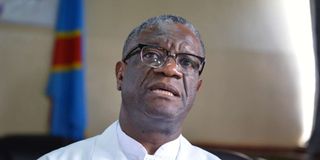Congolese Nobel laureate: Establish war crimes tribunal for DRC

In this file photograph taken on October 6, 2018, Nobel Peace Prize winner Denis Mukwege talks to the press at the Panzi hospital in Bukavu, in the Democratic Republic of the Congo's South Kivu province, a day after receiving the prestigious award.
Congolese surgeon Denis Mukwege may be a global hero, famed for reconstructing the damaged organs of women and children sexually violated in the country’s war.
But now the 2018 Nobel laureate is seeking justice for victims after calling for an international tribunal to specifically look into war crimes in the Democratic Republic of Congo (DRC).
A long-running conflict has plagued the eastern parts of DRC for more than two decades, with Dr Mukwege saying the players have not been punished.
Four months ago, President Felix Tshisekedi’s administration imposed a ‘state of siege’ and replaced all civilian administrators in the region with military heads following increased attacks from rebels.
"Despite the state of siege established in North Kivu and Ituri, the security situation does not seem to improve in these provinces," Dr Mukwege said in a statement, referring to recent killings in Beni and Irumu in Ituri.
“Faced with the failure of political and security solutions, we are convinced that the path to lasting peace will involve recourse to all the mechanisms of transitional justice."
He added: "As world leaders will soon be speaking at the United Nations Annual General Assembly, we urge President Tshisekedi to seek UN help and the adoption of a resolution Council to set up, without delay, a team of investigators.”
These investigators, he said, will have to exhume the bodies in the many mass graves in the east of the country as evidence of acts likely to constitute war crimes, crimes against humanity and genocide.
The Congolese president must also, he adds, "expressly ask the UN for the establishment of an international criminal tribunal for the DRC and support for the establishment of specialised mixed chambers to render justice to the victims".
He said "we must put an end to the culture of impunity that has fueled conflicts in our country since the 1990s".
Millions dead
The tragedy in eastern DRC has dragged on since Joseph Kabila was in power, and has stalked the regime of President Tshisekedi for three years, with none of the leaders succeeding in stemming violence and offering final peace to the Congolese people.
Between one and six million people are estimated to have died in the war since 1998, according to the Congolese. The exact figure is hard to pinpoint as no one is tracking the death toll.
In 2021 alone, more than 1,200 civilians have been killed in North Kivu and Ituri, according to the UN High Commissioner for Refugees (UNHCR). And with each massacre, Congolese authorities point an accusing finger at ADF, the Ugandan rebel group established in the DRC.
But the government says recent security measures are bearing fruit.
"The government of the republic reassures that the state of siege is already bearing fruit. A scrupulous follow-up is required in order to achieve the final objective, that of the definitive return of peace in the eastern part of the country," said Patrick Muyaya, Congolese government spokesperson.
The UN mission for stabilizing DRC, commonly called Monusco, which has been in the country since 1999, says it is committed to returning peace to the region.
Monusco head Bintou Keita reiterated that peacekeepers are working to protect civilians.
“We will not be discouraged, we will never be discouraged. We have an objective, which is to support the country to achieve peace consolidation,” she said.
Violence in DRC has pushed more than 1.4 million people to seek refuge in Uganda. More than five million internally displaced people have fled violence, according to figures from UNHCR.





